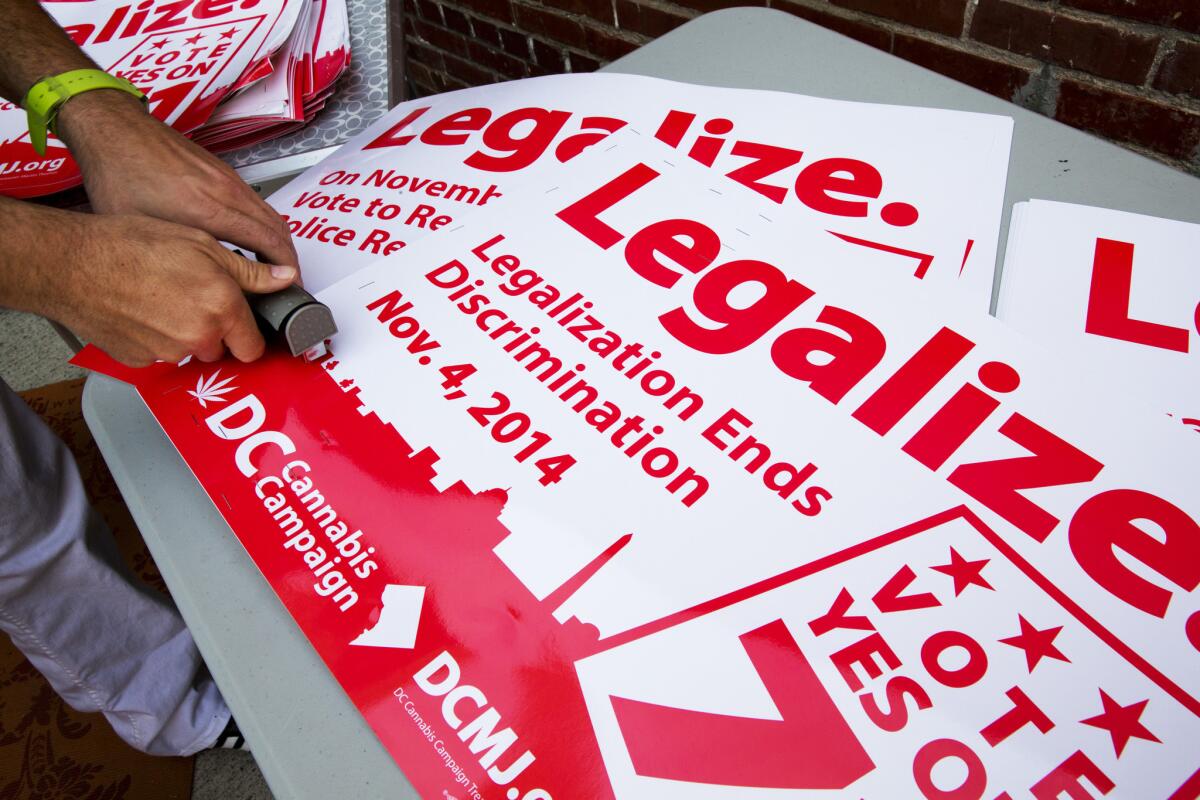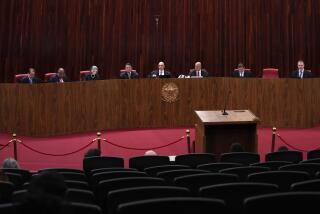A haze of uncertainty over Washington, D.C.’s marijuana law

- Share via
Reporting from Washington — The city that brought America government shutdowns and all-night filibusters made recreational marijuana use legal Thursday. And the foggy dispute over whether the law is even valid has probably made some people in the District of Columbia wish they were smoking some.
It’s a fight that could make sense only in Washington, involving language drafted in backrooms of Congress, partisan bickering and a disputed loophole that allowed the law to take effect at midnight.
By Thursday morning, recreational pot supporters in the nation’s capital were lighting up in their homes to celebrate. Many were getting high as they normally do, said Zack Pesavento, press officer for the D.C. Cannabis Campaign, which led the successful referendum on recreational pot in November. “Now they just don’t have to worry about getting arrested for it.”
Pesavento said his organization did not hold an official pot party, in keeping with the spirit of the law, which allows smoking marijuana in small amounts at home.
“The mayor has done exactly what she was elected to do, which is uphold the will of the people,” said LaToya Foster, spokeswoman for Mayor Muriel Bowser. “What happens next, we just have to wait and see, but right now the mayor has made it clear that at 12:01 this morning, the law went in effect.”
Residents voted overwhelmingly to allow growing and possessing small amounts of marijuana. But Congress, using its oversight authority over the nation’s capital, inserted a provision into a massive December spending deal that prevented the local government from enacting the law.
A dispute over the meaning of “enact” left uncertainty over what exactly is legal. It also sparked a standoff between the Democratic mayor, Bowser, and the Republican-led Congress, which made oblique threats of jailing city officials if they proceeded with legalization.
The dispute highlights the constant tension over autonomy in this city of largely liberal voters that is overseen by an increasingly conservative Congress. The local issue also holds symbolic value in the national battle over marijuana laws, given the district’s position as the headquarters in the war on drugs.
“We’re the nation’s capital, so I feel like it just makes people uneasy,” said Ellen Bloom, a 24-year-old resident strolling near the White House this week. She said she voted for legalization but did not smoke pot. “Maybe it’ll set the stage for the rest of the country.”
Rep. Jason Chaffetz (R-Utah), who chairs the committee that oversees the district, warned city officials in a letter Tuesday that they would be “in willful violation of the law” if they moved forward with legalization. His letter announced an investigation and demanded a list of city employees “who participated in any way in any action related to enactment” in crafting the city’s marijuana guidelines released this week.
But legalization advocates and city officials argue that they are simply carrying out a law that voters enacted. And Congress failed to use its specific authority to overturn the marijuana law within an official review period, which expired Wednesday.
Eleanor Holmes Norton, a Democrat and the district’s nonvoting delegate in the House, was furious over what she called “unnecessarily hostile congressional reactions.”
“There could be a good-faith disagreement over the language here,” said Norton, who supports legalization and says she helped the city with its legal interpretation. “That’s all there is. And baseless threats won’t heal it.”
Norton says her support is based on studies showing minorities have been disproportionately marked with criminal records. She insists the district is not trying to defy Congress, even as many residents complain that its authority over local matters is overbearing.
“We understand their authority,” she said. “We understand it so well we want to get statehood so they don’t have that authority.”
The fight with Congress has prevented the City Council from studying more specific regulations, or crafting ways to allow legal pot sales, as Colorado and Washington state have done. Officials in Alaska, which this week became the third state to legalize pot for recreational use, quickly began work to craft policies to create a legal marijuana market. Oregon voters legalized pot in November, but it won’t become legal there until July.
The bare-bones rules released by Bowser and Police Chief Cathy Lanier on Tuesday were intended to make clear that pot possession is restricted to less than two ounces and is legal only for adults over 21. Marijuana cannot be sold, nor can it be used in public. Driving while high also remains illegal. Marijuana is already decriminalized in the district, so Bowser characterized legalization as incremental.
A city website poses a number of questions in Q&A format, including whether D.C. is “going to be like Amsterdam” (no) and whether one “can eat a marijuana brownie at a park” or bus stop (also no).
But there are plenty of unanswered questions, including whether the plants can be grown on private property and where a law-abiding citizen might obtain the seeds.
City leaders want to prevent marijuana clubs from forming, but have not yet passed an ordinance to ban them. There is also a question of federal regulation in a city that has multiple law enforcement agencies.
“When Colorado legalizes marijuana, there’s a buffer of Rocky Mountains and eastern plains,” said Aaron Houston, a strategist for Weedmaps, a consumer website that tracks marijuana sales. “Here, the DEA or the FBI only have a few blocks to go.”
Opponents of legalization say those on the other side of the debate may be overplaying their hand in Washington, particularly if the council attempts to set up a legal distribution system and collect taxes.
“I don’t think Congress, especially this Congress, is just going to roll over and play dead,” said Kevin Sabet, a former advisor to three presidents who is executive director of the anti-legalization group Smart Approaches to Marijuana.
He added: “I find it a little astonishing that the collective group-think on this has been that D.C. residents really want a marijuana store down the street from their kids’ school.”
Twitter: @noahbierman
More to Read
Sign up for Essential California
The most important California stories and recommendations in your inbox every morning.
You may occasionally receive promotional content from the Los Angeles Times.














